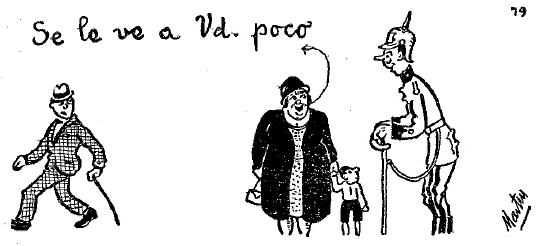
| Языки :: Испанский |
| Аудио |
 |
|
|
229 |
Español |
Spanish |
|
Lección Setenta y nueve (79) |
||
| León pide consejos (continuación) | Leo asks advice[s] (continued). | |
| 1 |
León. — ¿Y se come bien? Curro. — Magníficamente, mejor que en cualquier hotel de aquí. León. — Otros me han dicho que vaya a Caldeira. |
Leo. — And does one eat well there? — Curro. — Splendidly, better than in any hotel here. — Leo. — Others told me to go [that I go] to Caldeira. |
| 2 |
Curro. — ¡Oh, Caldeira! ¡Admirable! ¡Qué veranos he pasado allá! Unas muchachas gallegas preciosas. Un paisaje... unos manzanos... (1). |
Curro. — Oh! C.! Admirable! What summers I have passed there! Charming Galician girls. A scenery... Apple trees... |
| 3 |
León. — Y este balneario de la Carbonera ¿qué tal es? Curro. — ¿La Carbonera? Un paraíso. Allá se pone uno bueno (2) sin querer. |
Leo. — And that watering establishment of la C., what [what such] is it like)? — Curro. — La C? A paradise. One gets well again [puts oneself good] without trying to [wanting (it)]. |
| 4 |
El hotel está a una altura grandísima sobre el nivel del mar.
Y luego una gente tan campechana (3) tan simpática... |
The hotel is at a very great altitude above sea level. And then, so good and kind people! |
| 5 |
León (aparte). — Pues señor, este hombre no me ha sacado de duda (4). Todo es magnífico. |
Leo (aside). — Well, my dear sir, this man has not driven out my uncertainty [has not drawn me out of my doubt]. Everything is splendid. |
| 6 |
(Mirando con los gemelos). Allá están Lolita y Trinidad. Voy a saludarlas. Adiós, Curro (5). Curro. — ¡Adiós León! Hasta otro rato. |
(Looking through [with] opera-glasses) : There are L. and T. I go to greet them Good bye Curro. Curro. — Good bye, Leo. See you [until] another time. |
| 7 |
Lolita. — Hola. León. Trinidad. — Hola, Leoncito. Sandoval (hombre de barba negra y mirada aviesa). — Hola, León. Se le ve a usted poco (6). |
LoL — Here's Leo. Trin. — How do, my little Leo. — Sand (a many with a [of] black beard and scowling look). — Good evening, D. Leo. We [one] see little of you |
| 8 |
León. — Sí; estoy algo malucho. Sandoval. — Sí, va usted tomando facha de viejecillo (7). |
Leo. — Yes I am somewhat unwell. — Sand. — Yes you're in a (fair) way to take on the aspect of a little old man. |
| 9 |
León (sonriendo de mala gana). — Claro, el tiempo pasa para todos. Estoy pensando en salir este verano. Creo que voy a ir a Arrigorriaga. |
Leo (smiling on the wrong side) [of bad will] : Of course time passes by for all. I think of going away this summer; I think I'll go to A. |
| 10 |
Sandoval. — No haga usted ese disparate. León. — ¿No? ¿Por qué? Sandoval. — Porque es insoportable. |
Sand. — Don't do this silly thing. — Leo. — No? Why? — Sand. — Because it's unbearable. |
| 11 |
Allí no hay más que gente de Madrid, pero de lo más impertinente y ceremoniosa que puede usted suponer (8). |
There are only Madrid people over there, but among the most impertinent and ceremonious that you could suppose. |
| 12 |
Hay que vestirse para ir al comedor, para ir a tomar las aguas.
Luego caro como un demonio; |
One must dress up to go into the dining-room, to go and take the waters. Then it's expensive as hell [a devil]; |
| 13 | por llevarle la maleta a su habitación, diez pesetas; por un vaso de agua trescientas pesetas... | To carry your suitcase to your bedroom, 10 p.; for a glass of water, 300 p... |
| 14 |
León. — ¡Qué barbaridad! Sandoval. — Además (9), aquello es húmedo y malsano. ¡Se cogen (10) unos reumatismos terribles! Y de mala clase. |
Leo. — It's madness! — Sand. — Moreover it's damp and unwholesome. One catches terrible rheumatism! And of the bad kind [class]. |
| 15 | Yo he conocido a dos que murieron de un reumatismo deformante, cogido allá. | I have known [at] two (men) who died of a deforming rheumatism (they) caught there! |
| (Sigue.) | (To be continued.) |
| NOTES. | |
| 1 |
Charming is encantador (which also means enchanting
and enchanter) or precioso (which also m. precious),
— La manzana, apple; el manzano, a.-tree. |
| 2 |
Carbón, coal; carbón de piedra, mineral [of stone] coal; coal-seller, carbonero, -a. Bueno is good or in good health. |
| 3 | Campechano : franco, dispuesto para cualquier broma (joke) o diversión. |
| 4 |
Sacar, to draw. Sacar de un apuro, sacar de la pobreza, to help out of a difficulty, out of poverty. El aceite se saca de aceitunas, oil is made out of olives. — Sacó una peseta de su portamonedas, he drew a p. from his purse. — Saque usted la lengua. Stick out your tongue. (Before e, c becomes q in order to preserve its sound.) |
| 5 | Los gemelos, the twins, sleeve-links. |
| 6 |
Se ve poco, [sees itself] is seen little, one sees little of.
Se le ve a usted poco, one sees (at) her (dative) little [at] Your Honour, i.e. : You're not very conspicuous!... |
| 7 |
Facha : aspecto. — Viejecillo, dimin. of viejo. |
| 8 |
Lo (neuter), of the most, what is most impertinent. Note, however, that the adjective (ceremoniosa) agrees with la gente, femin. |
| 9 |
¡Qné barbaridad!, ¡Qué atrocidad! must not be taken literally;
they simply mean : It's madness! Would you believe it! etc... |
| 10 |
Coger, to seize, catch. Procure Vd. cogerle de buen humor, try to catch him in a good mood. — Reumatismo, o reuma : enfermedad (illness) que se mánifesta por dolores en las articulaciones, o en las partes musculares y fibrosas del cuerpo (body). |
|
Lola, Lolita, familiar for Dolores : pains (from
la Virgen de los Dolores, the Virgin of Pains). — Trinidad, Trinity is familiarly Trini, Smiling on the wrong side (of the face) is expressed by the picturesque phrase : con sonrisa de conejo (connyHo) : with a rabbit's smile. |
